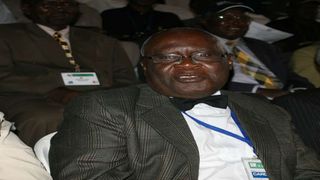
The late former Butere MP Martin Shikuku.
| File | Nation Media GroupPolitics
Premium
How Shikuku’s lengthy House addresses prompted limit to debate time
Longest serving MPs such as Vihiga Senator George Khaniri, who has served uninterrupted since 1996, have witnessed changes in Parliament over the years, and are steering constitutional reforms set to alter its structure again.
Mr Khaniri, 48, according to information provided on the parliamentary website, is in his 6th term in Parliament, a feat envied by his colleagues.
From 1996 when Mr Khaniri was plucked from the classroom to contest the Hamisi constituency seat in a by-election triggered by the death of his father, he has seen the transformation of Parliament from a House that was essentially the Executive’s lapdog to one with teeth to bite occasionally.
Mr Khaniri was a student in his early 20s at Jersey State University in New Jersey, USA, when he first got elected. He went on to serve four terms in the National Assembly and is currently doing his second term in the Senate, which was created by the 2010 Constitution.
Extension of the Executive
He recalls Parliament was then like an extension of the Executive, yet it was supposed to be an independent arm of the government — separate from the Executive and the Judiciary.
Since then, efforts have been made to transform Parliament from an appendage of the Executive to an independent arm of the government.
The enactment of the Parliamentary Service Act in 1999, which created the Parliamentary Service Commission (PSC) that manages the affairs of Parliament, was a key step towards an independent parliament.
The passage of the 2010 Constitution that clearly defines the mandates of the three arms with distinct budgets, was the game changer as Parliament asserted its legislative, representative and oversight role over the two other arms of government.
Some powerful oversight roles such as the vetting of Cabinet secretaries and principal secretaries, introduced since 2013, are targeted for removal under the proposed Building Bridges Initiative constitutional reforms.
Mature people
Mr Khaniri recalls Parliament at the time he made his debut there had mature people, with rules that were followed to the letter.
The only deficiency was its lack of independence, which has since been strengthened by the 2010 Constitution.
Among the MPs who shaped his debating skills in the House are the late Martin Shikuku (Butere), the late Oki Ooko Ombaka (Gem), Mr Raila Odinga (Lang’ata), Mr Musalia Mudavadi (Sabatia), the late William ole Ntimama (Narok North), the late Rashid Mzee (Kisauni) and then Ugenya MP, and now Siaya Senator James Orengo.

Mr Shikuku would also talk for hours nonstop and this was the reason the limitation for debating time was introduced.
Mr Shikuku had mastered the House Standing Orders to the extent that he would criticise any member who violated the House rules. With an authoritative Speaker in the name of Francis ole Kaparo on the chair, the situation would be worse to the ‘offenders’, he adds.
Mr Shikuku, he says, would also talk for hours nonstop and this was the reason the limitation for debating time was introduced — to allow other members time to also contribute to motions in the House.
Stickler to the rules
In the House, Mr Khaniri is regarded as a stickler to the rules, a trend he picked from the late Shikuku.
“I took interest to study and follow the rules to avoid the bashing and my long tenure in the House has made me understand the rules better to an extent that I cannot sit down, fold my hands when a member is violating the rules. I have a duty to notify the Speaker because it is good to observe the rules.”
The late Ntimama was liked because of his intellect and his mastery of English.
“The independence of Parliament is critical in advancing democracy. It should, therefore, be allowed to perform its role without interference from other quotas and the only way to do this is implementation of the Constitution,” says Mr Khaniri.
Sacked twice
The senator was twice sacked as assistant minister. The first axe fell on him during Moi’s reign for going against the President’s choice of Uhuru Kenyatta as his successor in the 2002 General Election.
Retired President Mwai Kibaki also sacked him for opposing the 2005 referendum on the new constitution, then a government project.
However, his high moment in the House is the 2002 regime change that ended Kanu’s authoritarian rule and the enactment of the 2010 Constitution.
For Mr Adan Keynan, who first served as Wajir West MP from 1997 to 2002 and then from 2007 to 2013, the creation of the PSC, which allowed Parliament to recruit its own staff, was a game changer.
“When I first got elected to Parliament, it was an extension of the Executive in terms of management as staff were seconded from the Executive,” says Mr Keynan, who represents Eldas, which was carved out of Wajir West Constituency during the 2011 delimitation of boundaries.
The PSC, he explains, gave Parliament autonomy over its budget and recruitment of staff — key factors to promoting independence.
Every Parliament is always an improvement on the previous one, says the MP.
“The current 12th Parliament is the most improved in the history of Kenya. But the current situation where Cabinet secretaries are appointed from outside the House is the missing link to better service delivery to the people,” he adds.
Cabinet ministers
The BBI report launched by President Uhuru Kenyatta last week has proposed to have Cabinet ministers picked from among the members of the National Assembly.
“The current situation where the Executive is outside the House is undemocratic and lacks efficiency as it forces House Committee chairmen to behave like ministers when answering colleagues’ questions,” says Mr Keynan.
Ms Cecily Mbarire, who entered Parliament through nomination in 2003, recalls Question Time in Parliament was the most popular session.
This is because it offered a platform for people to know what was happening right from the people responsible. She says this contributed to her success in Parliament.
However, now, there is a big gap between Parliament and the Executive, which must be bridged by having ministers appointed from among serving MPs as proposed in the BBI report, she says.
The promulgation of the 2010 Constitution was her highest moment in politics. However, the fact that there are many MPs in the House means that not a good number of them, especially women, get the chance to contribute to the national agenda.
Lowest moment
She also notes that the current situation where the opposition seems to have joined the Executive is the lowest moment in her political career.
“We have lost focus in terms of the roles the ruling and the opposition parties should play. Right now you cannot tell who is in opposition. We have adopted the politics of survival,” she says, noting that the gains women made in political participation have been watered down.
“It is not just the number of women in the House, but the influence they have. Nominating many women in the House diminishes their influence. Proper mentoring is required so that many women get elected,” says Ms Mbarire.





